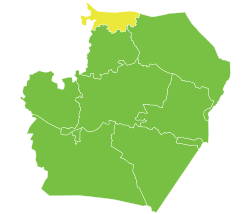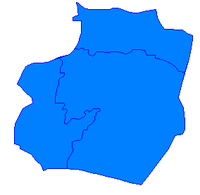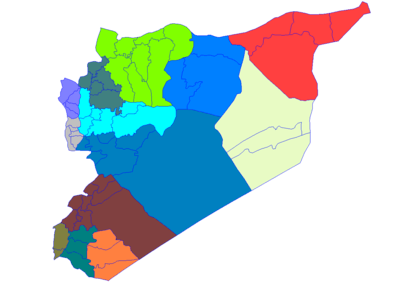Tell Abyad
| Tell Abyad تل أبيض | |
|---|---|
| Town and nahiyah | |
 Tell Abyad Location in Syria | |
| Coordinates: 36°41′51″N 38°57′24″E / 36.6975°N 38.9567°ECoordinates: 36°41′51″N 38°57′24″E / 36.6975°N 38.9567°E | |
| Country |
|
| Governorate | Raqqa |
| District | Tell Abyad |
| Elevation | 350 m (1,150 ft) |
| Population (2004 census)[1] | |
| • Town | 14,825 |
| • Nahiyah | 44,671 |
| Time zone | EET (UTC+2) |
| • Summer (DST) | EEST (UTC+3) |
| P-Code | C5792 |
| Geocode | SY110200 |
Tell Abyad (Arabic: تل أبيض, lit. 'White Hill', Kurdish: Girê Spî, Turkish: Tellebyad,[2] Armenian: Թել Աբյադ, Syriac: ܬܠ ܐܒܝܕ) is a town and nahiya in Syria. It is the administrative center of the Tell Abyad District within the Raqqa Governorate. Located along the Balikh River, it constitutes a divided city with the bordering city of Akçakale in Turkey.
On 16 June 2015, the town was captured by the Kurdish People's Protection Units (YPG) in the course of their Tell Abyad offensive, and since then has remained under their control.[3] As a preliminary result of the ongoing Syrian Civil War, Tell Abyad today is situated in Kobanî Canton within the de facto autonomous Federation of Northern Syria – Rojava framework.

History
In antiquity, Tell Abyad and the surrounding region was ruled by the Assyrian Empire and settled by Arameans. Tell Abyad could have been the site of the neo-Assyrian–era Aramean inhabited settlement of Baliḫu, mentioned in 814BC.[4] Later, various other empires ruled the area, such as the Romans, Byzantines, Sassanids, Umayyads, Abbasids and finally the Ottoman Empire. Tell Abyad remained Ottoman till the end of World War I, when it was incorporated in the French mandate of Syria.
The modern town was founded by Armenian refugees from Turkey and survivors of the deportations conducted during the Armenian Genocide, with around 250 Armenian families living in the city prior to the civil war.[5]
Syrian Civil War
After the Syrian Civil War started in 2011, diverse Islamist opposition groups controlled the town, some under the flag of the Free Syrian Army. On June 30, 2013, Tell Abyad was captured by the al-Nusra Front and the Islamic State of Iraq and the Levant (ISIL), who raised their flag at the border crossing with Turkey.[6] After ISIL defeated the Kurdish forces, the YPG and Jabhat al-Akrad, ISIL fighters announced from the minarets of the local mosques that all Kurds had to leave Tell Abyad or else be killed. Thousands of civilians, including Turkmen and Arab families, fled on 21 July.[7][8] ISIL fighters systematically looted and destroyed the property of Kurds and resettled displaced Arab Sunni families from the Qalamoun area (Rif Damascus), Deir ez-Zor, and Raqqa in abandoned Kurdish homes.[8]
In the June 2015 Tell Abyad Campaign, the town was besieged and in June 2015 taken over by forces of the Euphrates Volcano, the YPG and Free Syrian Army allies.[9] In the immediate aftermath, the Turkish military was accused of opening fire at Rojavan forces, which the Turkish Prime Minister Ahmet Davutoglu admitted.[10] Meanwhile, many of the tens of thousands of Arab residents — namely those tribes that allegedly took part in the expulsion of the local Kurdish population in 2013[11] — who fled the advancing Kurdish force have not returned, for fear of retribution from the YPG.
After the capture of Tell Abyad district, Kurdish YPG fighters have been accused of deliberately displacing thousands of Arabs and Turkmens from the areas they captured from ISIL forces in northern Syria, including Tell Abyad district[12][13] — a charge strongly denied by the Kurds.[14] The accusation was not backed by any evidence of ethnic or sectarian killings.[14]
The head of Syrian Observatory for Human Rights said the people who had fled into Turkey were escaping fighting and there was no systematic effort to force people out.[15] A report published by Kurdwatch, a Germany based internet portal, also claimed the accusations of displacements against PYD[16] but stated the following:
"None of KurdWatch’s Arab or Turkmen interview partners reported of ethnically motivated mass expulsions from Tall Abyad and the surrounding areas. In fact, we can assume that there have been no large-scale ethnically motivated expulsions in the region. For demographic reasons alone a »Kurdification« of the area is out of the question. The proportion of around ten percent Kurds is simply too low. At the same time, regulations such as only Kurds from ʿAyn al-ʿArab or Tall Abyad can act as a guarantor for refugees so that they can return to Tall Abyad from Turkey clearly discriminate on the basis of ethnicity."
According to the group, repressive measures have been taken out in first line against persons with ties to the Islamic State or other political opponents.[17]
However, many of the tens of thousands of Arab residents — namely those tribes that allegedly took part in the expulsion of the local Kurdish population in 2013[11] — who fled the advancing Kurdish force have not returned, for fear of retribution from the YPG.[18] According to the Washington Post, Kurds have been kurdifying the city after capturing it from ISIL, whish is resulting in rising tensions.[18]
The Kurds formally renamed Tal Abyad with its Kurdish name, "Gire Spi", and proclaim its new identity in signs throughout the town — written in the Latin script used by Turkish Kurds but not readily understood by Syrian Kurds or Arabs. They have also unilaterally detached it from the existing Syrian province of Raqqa and made it a part of their newly formed autonomous enclave, carved from areas traditionally inhabited by Kurds but steadily encroaching also on territories that were historically Arab.
Reports of fighters forcibly removing the local Arab population were rejected by the United Nations.[19]
Self-administration within Kobanî Canton
On 21 October 2015, a council including representatives of local Arab, Kurdish, Turkmen and Armenian communities declared Tell Abyad part of the de facto autonomous Federation of Northern Syria – Rojava. As a community in Kobanê Canton, the town enjoys self-governance in the Democratic Confederalist system of Rojava.[20] The 178-member higher council that governs Tell Abyad has elected mixed-gender co-mayors, as mandated under Rojava rules, initially ethnic Arab Mansour Seloum (later elected co-chairperson for the executive committee to organise a new constitution for Rojava, and replaced by ethnic Arab Hamdan al-Abad) and ethnic Kurd Layla Mohammed, the latter 27 years old and the first female mayor of Tell Abyad ever.[21] While previously education was available only in Arabic language, now Arabic and Kurdish are taught in schools and there are plans to introduce Turkish in addition; one focus of the administration is to encourage women to seek higher education.[21]
On February 27, 2016, Tell Abyad came under attack from ISIL militants. YPG militias and Asayish police forces repelled the attack and eliminated all of the ISIL attackers, but more than 40 security forces and around 20 civilians were left dead. A YPG spokesman claimed that ISIL attackers had crossed from Turkey to attack the town. Turkey quickly denied this claim. According to the Syrian Observatory for Human Rights, there was not any infiltration from Turkish borders but dormant IS sleeper cells and others entered the town on the eve of the offensive dressed YPG uniforms.[22] There have been multiple other instances of ISIL terror attacks in Tell Abyad, for example on 29 June and 8 July 2016 two bombings that each claimed ten civilian lives.[23][24]
On 15 September, the flag of the United States was raised over several public institutional buildings in Tell Abyad.[25] The United States Department of Defense confirmed that U.S. Special Operation Forces were flying U.S. flags in the town of Tell Abyad in Kobanî Canton to deter Turkish harassment shelling or attacks against Syrian Democratic Forces there.[26] Notwithstanding, Turkish military shelled the area on 22 September.[27]
Tell Abyad today also is a hub for Combined Joint Task Force – Operation Inherent Resolve training of new SDF recruits in the fight against ISIL in Syria.[28]
Demographics
According to multiple sources, the majority of the inhabitants of Tell Abyad and Tell Abyad District are Arabs,[29] with a Kurdish,[30] Turkmen[31] and Armenian minority.[32][33][34]
The PYD formed a council of elders in Tell Abyad which has the task to administer the region and which is said to be a fair representation of the ethnic composition of the town and the Arabic majority population. It consists of 15 people, of which are ten Arabs, three Kurds and respectively one Armenian and one Turkmen.[17]
Germany-based internet portal Kurdwatch reports that Tell Abyad is mainly populated by Arabs, and estimates that in the environs of Tell Abyad, 15% of the population is Turkmen, 10% Kurdish and the rest being Arabs.[17] Other sources claim that Kurds make up between under 30%[35] up to 55%[30][36] of the population. Turkish Şanlıurfa governor estimated that 98% of the region is made up of Arabs and Turkmens.[31] In addition, there are many Turkmen families residing in the city center.[2]
References
- ↑ "General Census of Population and Housing 2004: Tell Abyad nahiyah" (in Arabic). Syrian Central Bureau of Statistics. Retrieved 15 October 2015. Also available in English: "Syria: 2004 census data". UN OCHA. Retrieved 15 October 2015.
- 1 2 Günümüzde Suriye Türkmenleri (in Turkish) — Suriye’de Değişimin Ortaya Çıkardığı Toplum: Suriye Türkmenleri, p. 20 ORSAM Rapor № 83. ORSAM – Ortadoğu Türkmenleri Programı Rapor № 14. Ankara — November 2011, 33 pages.
- ↑ Master. "YPG and rebels take full control on Tal Abiad city". Syrian Observatory For Human Rights. Retrieved June 30, 2015.
- ↑ Edward Lipiński (2000). The Aramaeans: Their Ancient History, Culture, Religion. Peeters Publishers. pp. 122–. ISBN 978-90-429-0859-8.
- ↑ Taştekin, Fehim (October 29, 2015). "Is Turkey setting a Kurdish trap?". Al-Monitor.
- ↑ Tulin Daloglu (2014-06-30). "ISIS [sic] raises flag at Turkish border". Al-Monitor. Retrieved 2015-09-10.
- ↑ "Selected testimonies from victims of the Syrian conflict: Twenty-seventh session" (PDF). UN Human Rights Council.
- 1 2 "Report of the Independent International Commission of Inquiry on the Syrian Arab Republic: Twenty-seventh session". UN Human Rights Council.
- ↑ Lefteris Pitarakis And Bassem Mrque (June 14, 2014). "Thousands of Syrians flee into Turkey amid intense fighting". AP The Big Story. Associated Press. Retrieved June 15, 2015.
- ↑ "Turkey attacks Kurdish fighters inside Syria". aljazeera.
- 1 2 "In Raqqa offensive, Kurds seek 'insurance' against Turkish attack". France24. 8 November 2016.
- ↑ "Kurds accused of "ethnic cleansing" by Syria rebels". cbsnews. Retrieved June 22, 2015.
- ↑ "Syrian rebels accuse Kurdish forces of 'ethnic cleansing' of Sunni Arabs". The Telegraph. Retrieved June 22, 2015.
- 1 2 "Kurdish Fighters Seize Large Parts of IS Border Stronghold". The New York Times.
- ↑ "Syrian Kurds battle Islamic State for town at Turkish border". Reuters.
- ↑ "New Report: Ethnic Cleansing in Tall Abyad? Characteristics of YPG and PYD rule in the areas captured from the IS". KurdWatch.
- 1 2 3 "Ethnic cleansing in Tall Abyad?" (PDF). Kurdwatch. January 2016. Retrieved 14 May 2016.
- 1 2 "They freed a Syrian town from ISIS. Now they have to govern it". The Washington Post. 2015. Retrieved 30 October 2015.
- ↑ "UN says no ethnic cleansing by Kurds in northern Syria". ARA News.
- ↑ Tom Perry (21 October 2015). "Town joins Kurdish-led order in Syria, widening sway at Turkish border". Reuters. Retrieved 21 October 2015.
- 1 2 Wladimir van Wilgenburg (2016-07-01). "Young female mayor breaks boundaries in Syrian town freed from Islamic State". MiddleEastEye. Retrieved 2016-07-01.
- ↑ "By Caliphate Cubs and Self-Defense Uniforms, IS Makes a Big Operation". syriahr (in Arabic). Retrieved February 28, 2016.
- ↑ "ISIS attack kills ten in Kurdish-held Syrian town". ARA News. 2016-07-01. Retrieved 2016-07-09.
- ↑ "Islamic State jihadis threaten civil peace in Syria’s Tell Abyad". ARA News. 2016-07-08. Retrieved 2016-07-09.
- ↑ "US flags raised in Syrian Kurdish-held town of Tal Abyad". Kurdistan24. 16 September 2016.
- ↑ "Mysterious American Flags In Northern Syria Were Planted By U.S. Troops, Pentagon Says". Huffington Post. 20 September 2016. Retrieved 20 September 2016.
- ↑ "Turkey bombs Kurdish positions near Syria's Tel-Abyad". AraNews. 22 September 2016.
- ↑ "U.S. military aid is fueling big ambitions for Syria’s leftist Kurdish militia". 7 January 2017.
- ↑ "Arab Tribes Split Between Kurds And Jihadists". Carnegie Endowment for International Peace. 2015. Retrieved 26 June 2015.
- 1 2 "Kurds eye new corridor to Mediterranean". Al-Monitor.
- 1 2 "US Expresses Concerns About PYD Human Rights". BasNews. Archived from the original on August 6, 2015. Retrieved 26 June 2015.
- ↑ "PanARMENIAN.Net - Mobile". panarmenian.net. Retrieved 14 May 2016.
- ↑ "Surviving Aleppo: An Interview with Nerses Sarkissian". Armenian Weekly. 9 December 2015. Retrieved 14 May 2016.
- ↑ "BasNews". 6 August 2015. Archived from the original on August 6, 2015. Retrieved 11 May 2016.
- ↑ "YPG's greatest challenge: Kurdish-Arab relations in Syria". Middle East Eye. Retrieved 14 May 2016.
- ↑ "Violation Documentation Centre" (PDF). 2013. Retrieved 14 May 2016.
Notes
External links
![]() Media related to Tell Abyad at Wikimedia Commons
Media related to Tell Abyad at Wikimedia Commons



